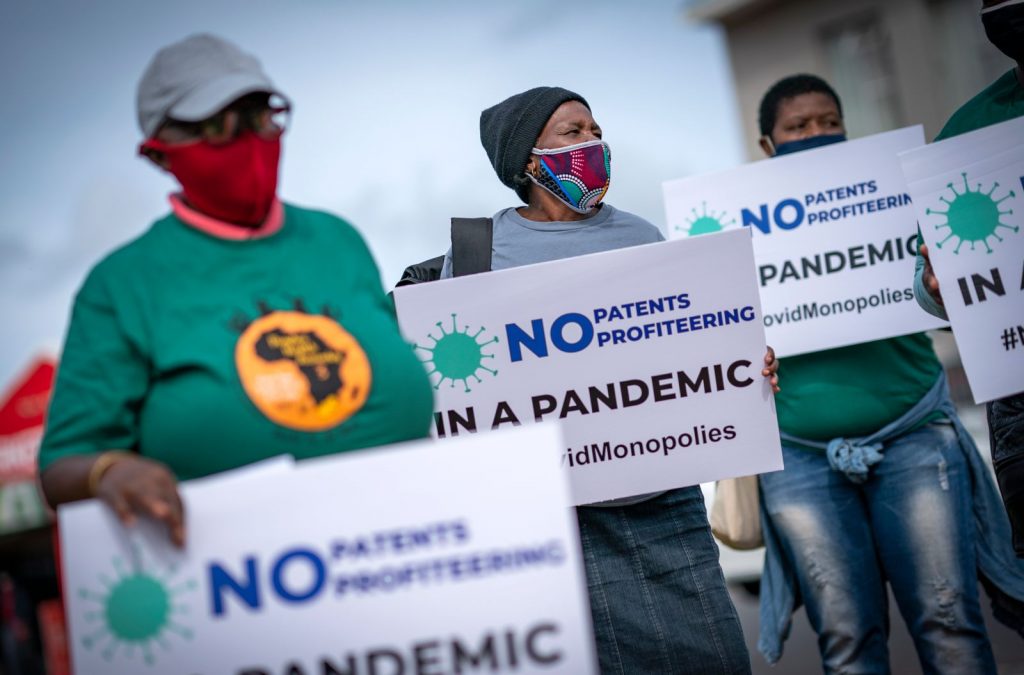By B.C. Daurelle and K.S. Mehta
As the Omicron variant of Covid-19 surges even among the boosted, it is imperative to examine the ways that capitalism and vaccine imperialism have prolonged the pandemic and will continue to threaten the lives of millions worldwide. Vaccination is a critical tool (but not the only tool) for ending the pandemic. Currently, over 8.8 billion vaccine doses have been administered, but 43 percent of the world’s population has yet to receive a single shot. In the Global South, only about 8 percent of the population has gotten even a single dose.
Meanwhile, the populations of the wealthiest countries are getting vaccinated 25 times faster than those in poorer countries. Israel is rolling out fourth doses for seniors, the immunocompromised, and healthcare workers. Under such vastly unequal conditions, vaccination alone will not end the pandemic. As long as the vast majority of the Global South is still unvaccinated or undervaccinated, and countries continue to neglect large-scale, non-pharmacological public health measures to decrease transmission, new variants will continue to emerge, causing more death and illness, and ensuring that imperialist nations will continue to hoard vaccines.
Capitalism Is to Blame
As predicted by global health experts, the strategy of wealthy countries donating vaccines to countries which cannot afford them has failed completely. Only 14 percent of the 1.8 billion promised doses have been delivered to low-income countries. Six times more boosters are administered globally every day than primary doses in low-income countries. What this approach has ensured, however, is that the pharmaceutical companies which control the vaccines’ intellectual property have made enormous profits, and will continue to do so. For example, Moderna recorded about $10.7 billion in revenue and more than $7.3 billion in profit from its vaccine in the first nine months of this year, and expects to generate between $17 and $22 billion in sales next year, possibly from the sales of a new Omicron-specific booster. Pfizer expects that its Covid-19 antiviral pill, Paxlovid, will reach sales of at least $14 billion next year.
It’s unconscionable — both morally and from a public health perspective — that these vaccines remain under private control, particularly since they were developed largely with public funding. Moderna developed its vaccine with scientists from the National Institutes of Health and got a large chunk of its funding through a contract awarded by the U.S. Biomedical Advanced Research and Development Authority (BARDA). BARDA has access to the entire “vaccine recipe,” which contains the chemistry, manufacturing, and controls information, including manufacturing instructions in step-by-step detail.
However, the BARDA contract has one limitation: the government cannot share certain categories of information developed at private expense. This is how Moderna is trying to have its cake and eat it too: taking public money to develop a vaccine that should be a public good, then using intellectual property (IP) protections to prevent information-sharing and generate enormous profits. The Biden administration could, at any moment, share any data that was not developed at private expense, or use other legal authorities such as the Defense Production Act to do so.
If Biden took the steps currently within his power to force the release of even just Moderna’s IP, global vaccine production could scale up drastically. Opponents of patent waiving cite production capacities and the high quality standards as limits to vaccine production, but the recently released Access IBSA report identifies 120 companies with the capacity to begin manufacturing the vaccines immediately. The authors of the report note that there are likely many times more facilities with the capacity to do so. The Biden administration and major pharmaceutical corporations’ refusal to share patented information and technical knowledge required to manufacture vaccines —not to mention a suite of other information for producing therapeutic or diagnostic materials — is prolonging the pandemic and the steady stream of more transmissible and vaccine-resistant mutations.
The problem is not limited to Moderna’s data sharing permissions; intellectual property rights to medical technologies are a longstanding problem. The 1994 agreement on Trade-Related Aspects of Intellectual Property Rights (TRIPs), establishes standards, enforcement, and dispute settlement for IP globally, and has been a huge barrier to expanding worldwide vaccine data sharing. The TRIPs agreement represented a drastic departure from the previous worldwide intellectual property regime, which generally denied patent protections to pharmaceutical products.
In October 2020, the governments of India and South Africa proposed a TRIPs waiver proposal that would temporarily waive IP protections for technologies needed to prevent, contain, or treat Covid-19, including vaccines and vaccine-related technologies. The U.S. has offered very limited support, expressing support for waiving patent rights for vaccines, but has done nothing concrete to support this endeavor. The EU has instead offered a counterproposal, which largely reaffirms existing TRIPs provisions to allow compulsory licensing or generic manufacturing during emergencies. But compulsory licensing would take far too long to enact because it requires going on a country-by-country basis, and it doesn’t cover sharing information about how to manufacture vaccines.
A New Cure for an Old Disease
The current situation is just the latest in a long history of prioritizing IP and profit over expanding production and access to life-saving medications. A near-identical debate played out when, in 1996, HIV stopped being a death sentence thanks to antiretroviral medications. In the U.S. and Europe, after decades of government neglect, people living with HIV were finally able to start getting treatment (though many were still priced out for quite some time).
Despite a manufacturing cost of only $1 per daily dose of the antiretroviral combination, manufacturers in countries with patent protections could dictate prices. Thus, in South Africa, where the average annual income was $2,600, a month’s supply cost $800. South Africa’s attempt to import the drugs at lower rates was considered a violation of the TRIPs agreement, and the U.S. Trade Representative threatened to impose devastating trade sanctions. People living with HIV/AIDS and suffering complications in Africa were left to die for another decade due to limitations on production of generic medications.
The TRIPs agreement, passed in 1994 with strong backing from the Clinton administration, has been killing people for as long as it has been in effect. It will continue to kill as long as IP and the profits it generates are prioritized over human need..
We Need a Robust TRIPs Waiver
So, what would an effective IP waiver look like? A good first step is outlined by Médecins Sans Frontières (MSF; Doctors Without Borders), which has compiled a comprehensive response to the EU’s watered-down counterproposal, showing how the unwillingness to touch private property is directly responsible for continued inequities in vaccination and Covid treatments. Nothing short of a complete ban on IP protections can ensure the rapid scale-up of preventive, diagnostic, and vaccine technologies.
Perhaps more importantly, MSF highlights that the waiver must extend beyond just the obvious top-line items such as vaccine formulas and manufacturing techniques. The waiver “must also cover other medical tools, particularly medicines and diagnostics, as well as their underlying technologies, raw materials, components, manufacturing data, methods, delivery devices and process of production.”
MSF correctly recognizes that a waiver narrowly focused on vaccines would ultimately be doomed to fail, because Covid cannot be defeated with vaccines alone, particularly in a world riven by pre-existing medical inequalities. A waiver robust enough to stand a chance of stopping the spread of Covid is, implicitly, one that breaks down the barriers of uneven development embedded in the colonized world’s medical infrastructure.
100+ Companies Could be Producing Vaccines
It goes without saying that trusting pharma giants like Moderna and Pfizer to vaccinate the world won’t end the pandemic. They have worked hard to cast doubt on the necessity of an IP waiver, and Moderna in particular has dramatically underdelivered on its promise of donating 500 million doses, and has simply not answered the phone when poorer countries have tried to negotiate purchases. There is simply no excuse for leaving life-saving technology in the hands of corporations.
Whether or not the giant pharma countries can actually produce enough vaccines is not just a logistical question. There remains a host of other decisions: when and where they are made, to whom they are sold, and how to prioritize their distribution. These decisions, of course, should not be made by vaccine imperialists like Albert Bourla, Stephane Bancel or Bill Gates, or even by a more well-intentioned body like the WHO. The complete body of knowledge relating to the vaccine manufacturing process must be made public-domain knowledge, enabling the 120 factories identified in the report to begin producing vaccines. And it’s not just the manufacturing of vaccines that should be democratized: the entire suite of medical knowledge, from detection techniques, to data sets on patients, to the technical specs of delivery and storage devices, must be made freely available.
Information sharing is essential for stopping the spread of Covid, and we need an IP waiver that goes even further. Vaccine access remains incredibly important — vaccination still protects against the most severe side effects of even Omicron — but a serious strategy for ending the pandemic entails a broad dismantling of the imperialist global health system. This dismantling won’t be led by pharmaceutical companies, who have fought tooth and nail to keep their lucrative IP protections. The only way to ensure a quick and effective worldwide vaccination campaign is to take these decisions out of the hands of pandemic profiteers.
Who should technical knowledge and important decisions about manufacturing and distribution belong to instead? The TRIPs waiver is a first step, but it doesn’t go nearly far enough. Life-saving medical technology should not belong to two or three companies in America and Europe, but neither should it belong to just a few hundred companies around the world. This knowledge and technology should be publicly available, and in the hands of workers of all companies with the capacity to manufacture vaccines as well as diagnostics, therapeutics, and medical equipment.
While remaining very critical of the pharmaceutical giants, we should remember that it was their researchers and workers who have made the technology that has been so critical to reducing disease spread and severity. Workers are capable of deciding what needs to be produced most urgently, as we saw early in the pandemic when GM workers collectively decided to pivot to manufacturing surgical masks instead of auto parts. If these decisions were in the hands of workers, perhaps it would not have taken a global pandemic to produce effective vaccines for coronaviruses, several of which were barely kept from spreading widely in the past two decades. And, if the knowledge hoarded by these companies were freely and universally available, there’s no question that huge leaps in distribution, production, and technological improvements would quickly follow. In other words, the best way to democratize medical technology is to place it under worker control.
In the interim, we must advocate for other demands. The patents must be waived, not only for the vaccine ingredients, but also the technical manufacturing know-how. This information must be shared globally, and existing factories that have the manufacturing capacity should produce vaccines. These vaccines should not exclusively be bought up as booster doses by wealthy nations, and countries in the Global South that have been forced to remain largely unvaccinated or undervaccinated should have priority access.
Finally, vaccines alone will not be able to end the pandemic at this stage. We must fight for expanded testing capacity and contact tracing, access to therapeutics like monoclonal antibody infusions or oral antiviral medications, and provision of free, high quality masks. We must fight to end vaccine imperialism and all the structures that uphold it in the present, for a future where access to quality medical care and resources does not depend on wealth or citizenship.











